How to clean and maintain garden tools – make them last longer and work better
If you clean and maintain garden tools regularly, they’ll probably last a lifetime.
Secateurs and shears will cut more smoothly. They’ll be easier to use. Spades, forks and trowels won’t rust. And handles won’t swell or split.
It only takes a few minutes to clean secateurs, trowels and spades after you use them. And if you add in another ten minutes for sharpening or oiling every few weeks, your tools will work beautifully for years.
It’ll also be less strain on your hands and arms – cleaning secateurs makes them much easier to use!
So Dan of Dan Cooper Garden to showed me how to care for garden tools in two easy ways.
Firstly, you can use specialist tool maintaining kits or products.
Or secondly, we’ll show you how to clean garden tools with common household cleaning products.
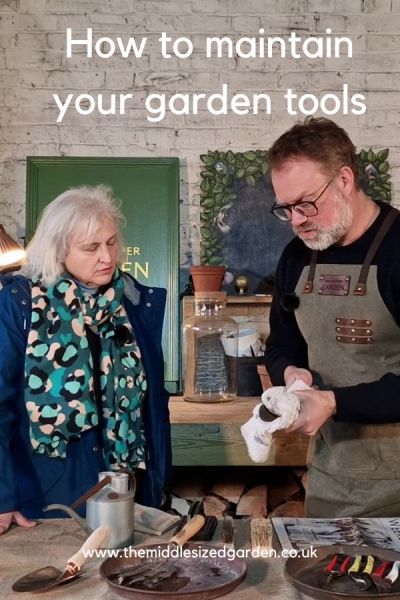
Dan Cooper showing me how to clean and maintain garden tools
(Disclosure: Dan sells a few of the cleaning products mentioned here. Others are available on Amazon, where I am an affiliate, see disclosure. Other links are not affiliate, and common household cleaning products are available widely. However, Dan’s main products are garden accessories, furniture and high quality garden tools, all of which he uses himself in his own garden. So he knows what works and what doesn’t.)
Dan has also made a list of the most useful garden tools, so that you don’t waste money on tools you rarely use.
If you prefer to watch a video, you can see Dan demonstrate cleaning garden tools here.
Can you leave garden tools outside?
‘The number one enemy of your garden tools is water and being wet,’ says Dan. ‘Never leave forks, trowels and spades outside (or keep them outside). The damp causes metal to rust and wooden handles to swell up.’
It’ll be easier to maintain garden tools if you always bring them inside after working with them. They won’t rust as fast and the wood won’t crack or swell as easily.
It’s also best to store tools hanging up. This means the air will also help keep them dry.
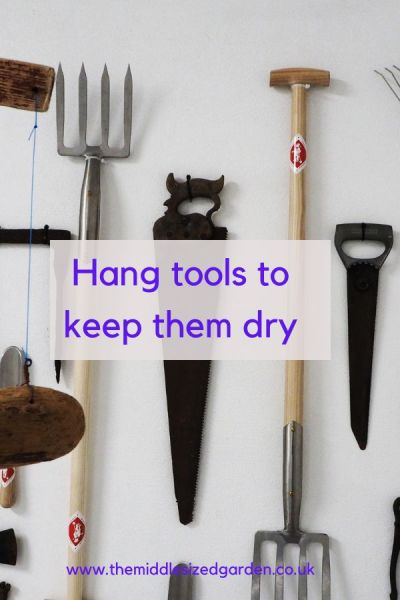
Hang tools up to keep them dry. It’ll help keep rust away.
How to care for garden tools
When you finish gardening, use a hose or watering can to remove excess soil. Then dry both the metal parts and the handles with a cloth or old towel. ‘It’s absolutely imperative that garden tools are dry when you put them away,’ Dan says.
He suggests keeping old rags and towels. You can tear up old cotton clothes or sheets to make rags too.
‘That’s really all you need to do to maintain garden tools after using them every day,’ says Dan.
If you’ve got dried dirt on garden tools, Dan says it’s best to brush it off with a bristle brush. He has a special tool cleaning brush but you can also use a barbecue scouring sponge or a non-metallic kitchen scourer.
Unless you’ve got rust to get rid of, Dan advises against metal brushes. Non-metallic scourers won’t leave scratches.
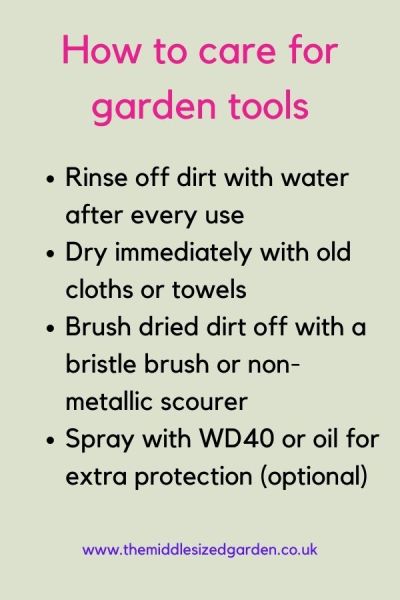
How to maintain garden tools over winter
If you put your garden tools away for the winter or won’t be using them for a while, add a spray of WD40. ‘Simply spray a thin layer over the metal parts and give it a wipe with the cloth. Then your spade, trowel or fork will be completely protected from rust.
You can also spray the wooden handle with camellia oil or a similar oil. That will stop wood drying out or splitting.
How to remove rust from secateurs and other garden tools
If your garden tools are rusty, firstly scrub the rust away using a wire brush or a barbecue scouring pad.
Once you’ve removed all the rust, wipe the tool. Then add a spray of WD40 and wipe it down again.
Or dip garden tools in white vinegar and WD40 to clear rust
Soak rusty secateurs or other garden tools in white vinegar for several hours, says Dan.
Then dip an old toothbrush in the same vinegar and use it to scrub rust out of springs or cracks.
Wipe the vinegar off. Rinse and dry. Then add a spray of WD40.
They’ll work so much better!
‘Don’t worry if they have a patina of age on them,’ Dan advises. ‘You don’t have to clean garden tools back to their shiny factory condition. Just get rid of dirt and rust.’
How to care for copper garden tools
Dan recommends using a steel wool on copper tools to bring back the shine.
Copper tools don’t rust so they won’t need any oil or WD40.
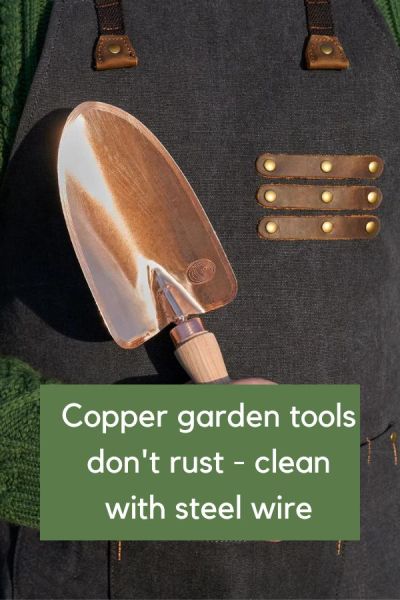
Copper garden tools are easy to maintain. This copper trowel is available from Dan Cooper Garden
How to restore wooden tool handles
To restore wooden tool handles, use sandpaper to get rid of marks.
Then Dan advises that you oil them to stop the wood cracking. He uses camellia oil, but many people also use linseed oil.
Note that links to Amazon are affiliate and help support this blog. Other links are not affiliate. No free or PR products have been featured.
How to clean and maintain secateurs and shears
It’s important to maintain secateurs, also known as pruning shears, on a regular basis. If you were a professional gardener, you would probably clean, oil and sharpen your /shears secateurs once a week. And that’s certainly what manufacturers recommend.
However, Dan points out that it depends on how often you use your shears or secateurs.
‘Clean garden shears/secateurs are easier to use. The more gunged-up they are, the more pressure you’re going to have to use to get them to cut through anything,’ says Dan.
How to get sap off shears/secateurs
You can get sap off garden shears and secateurs with a specialist product, such as Crean Mate Sap Eraser (Niwaki).
Dan adds a few drops of camellia oil to the Crean Mate. He then uses it to wipe all the sap off the blades of the secateurs.
‘Once you’ve finished, wipe clean with an old cloth or rag. Then apply a little more camellia oil, which coats the blades nicely.’
If you don’t have a sap eraser, you can use wire wool or some kind of household abrasive cleaner. Dan doesn’t use chemicals, so he likes to use Astonish – The Good One, but a bathroom or kitchen cleaner would also do.
Apply it with a piece of kitchen towel or cloth. Rinse off with water and dry well with an old cloth.
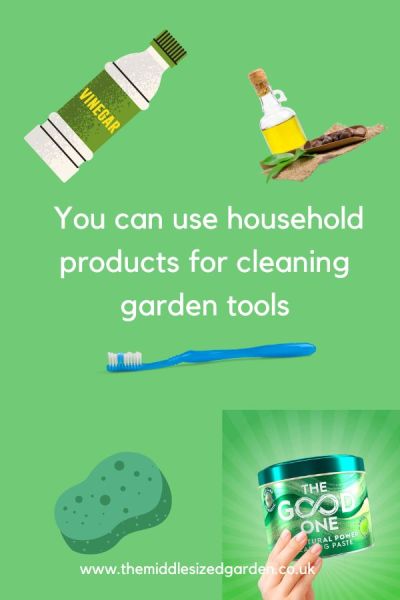
If you don’t have specialist tool cleaning products, use household cleaning products. Dan likes Astonish The Good One because he prefers not to use strong chemicals in the home.
Warning – never undo the central nut and bolt
Dan warns us all against undoing the central nut and bolt of the secateurs. I often see videos on maintaining secateurs where people take them apart completely and reassemble them.
However, Dan advises that this is a very tricky job. ‘When they’re assembled in the factory, they’re balanced to work really well. When you undo that, you change that. So unless you can re-balance them as well as the factory can, you’ll change the way they work.’
Reputable companies such as Felco and Niwaki offer services to repair or maintain garden tools if you’ve bought from them. If you’ve damaged your shears or secateurs, then it’s a good idea to get them serviced professionally.
I had a quick check to see how much this cost, and I’d say it’s roughly one third to half the cost of buying the same shears or secateurs new again. But check this yourself, as it may be different for different products.
Disinfect shears and secateurs regularly
‘A lot of plant diseases are transferred by sap,’ explains Dan.
Spray your blades with a disinfectant spray or mix a few drops of bleach with water and dip the blades into it. It’s a good idea to do this regularly. Some professionals disinfect every time they use shears or secateurs, especially if they are working in different gardens.
Don’t leave them soaking, though. Amateur topiarist Diane Perry uses disinfectant on her shears between plants, but she once left them soaking and they rusted.
If you are doing topiary, it’s particularly important to clean and disinfect tools, and don’t lend them to anyone else. Dirty tools can transmit box blight and other problems. See Diane’s tips for easy topiary shapes here.
Sharpen secateurs and shears every time you clean them
Sharpen your secateurs and shears as a regular part of how you clean and maintain garden tools.
The best way to do this is with a proper sharpening stone, designed for the shears or secateurs. Dan sells Niwaki sharpening stones designed for secateurs (shears). So do Felco, and you can get sharpening stones from Amazon or your local garden store, too.
Dan advises you to get a specialist sharpening stone for gardening tools. Don’t use your kitchen sharpeners as they are rather big and it’s more difficult to get the right angle.
More about Dan and Dan Cooper Garden
Dan used to work in retail, starting his Frustrated Gardener blog in his spare time. It charts his passion for plants and quickly became very successful.
So when he left his job, he decided to combine his professional experience in finding top quality products and his personal gardening interests to create Dan Cooper Garden. Dan Cooper Garden sells personally chosen garden tools, accessories, furniture and clothing.
As well as selling from the online shop, Dan takes Dan Cooper Garden to plant fairs, special events or parties.
See more of Dan’s advice in How to Group Pots to Make Them Look Like A Border, How to Grow Chrysanthemums For Glorious Late Season Colour and some very good tips on creating an outdoor kitchen in A Garden For Entertaining.
Pin to remember how to maintain garden tools
And do join us – sign up here for a free weekly email with more gardening tips, ideas and inspiration.
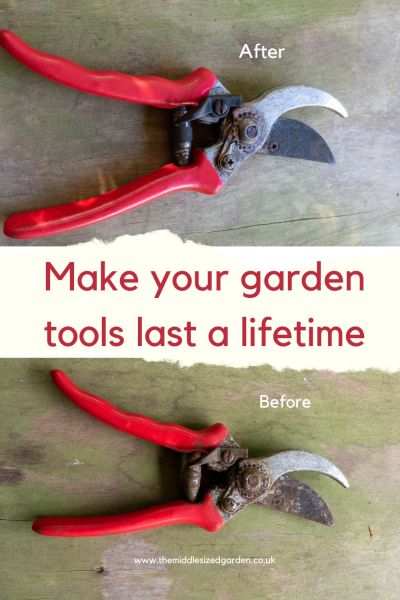





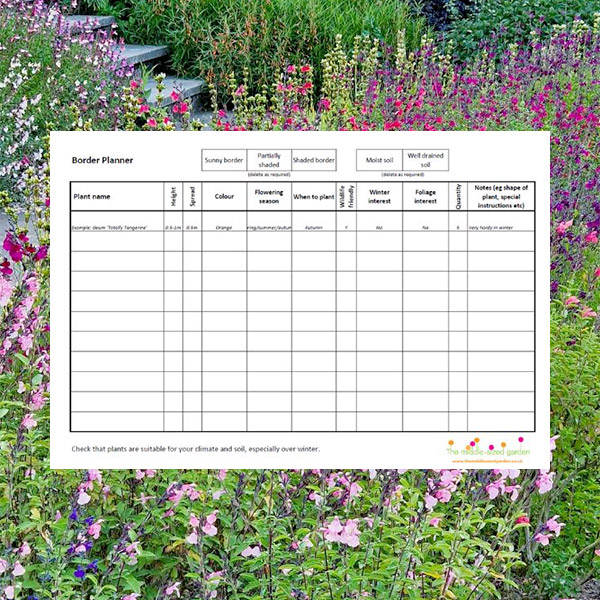

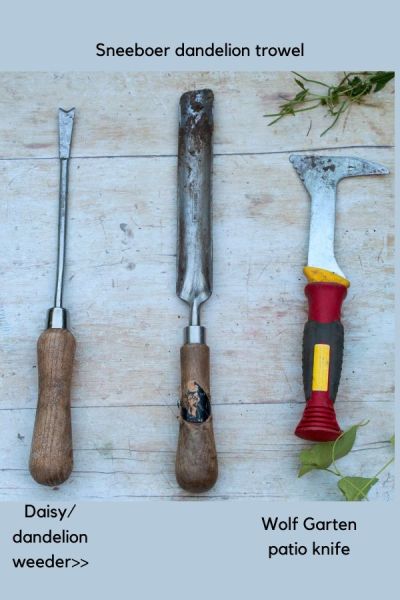
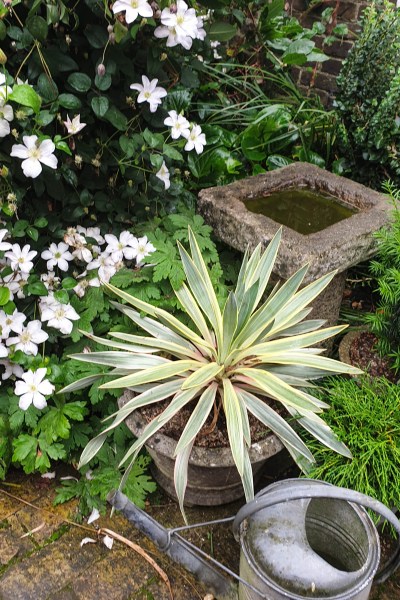
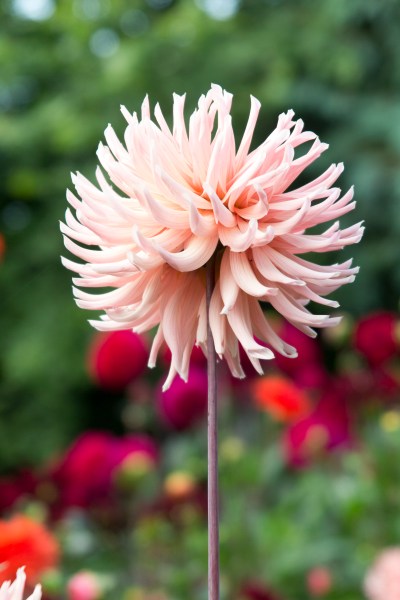






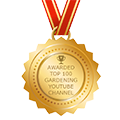







That was very helpful and informative .Luvyour blogs
Thank you!
Good read .Happy Christmas to you and yours .
Thank you and a Happy Christmas to you, too.
I thoroughly enjoyed reading your article on how to clean and maintain garden tools. As a keen gardener myself, I know how important it is to take good care of your tools so that they last longer and work better.
Your tips on cleaning tools with warm soapy water, using a wire brush to remove any rust or debris, and oiling the moving parts are all very helpful. I especially appreciate the reminder to wear gloves when cleaning tools as this can help to protect your hands from any sharp edges or rust.
Thank you.
A dab with methylated spirits can be useful for removing pine sap – even from clothing. The condition of the clothing afterward depends on the fabric composition, dye etc. I’ve used it on black cotton drill without ill effect.
Great tip, thank you.
The most brilliant article I’ve ever read about treating neglected secateurs & garden tools.
Thank you!
Thank you so much!